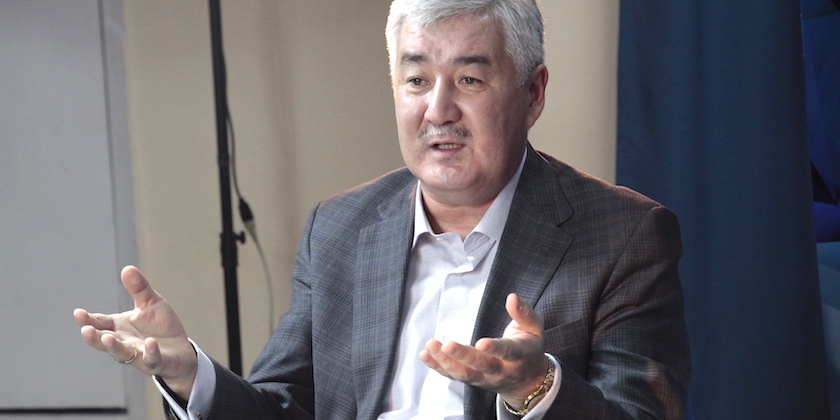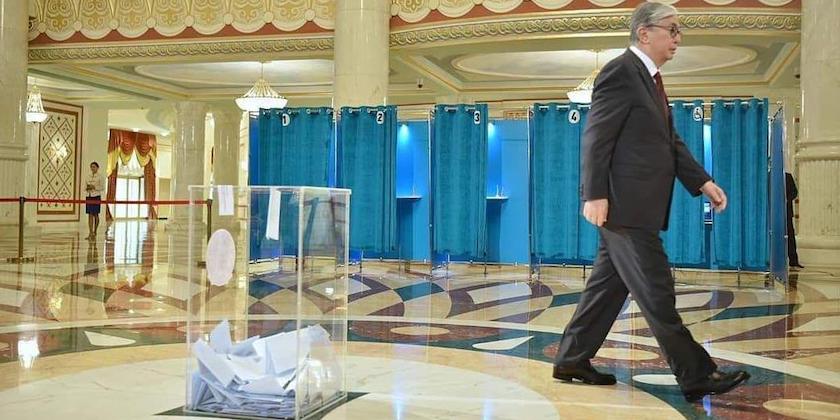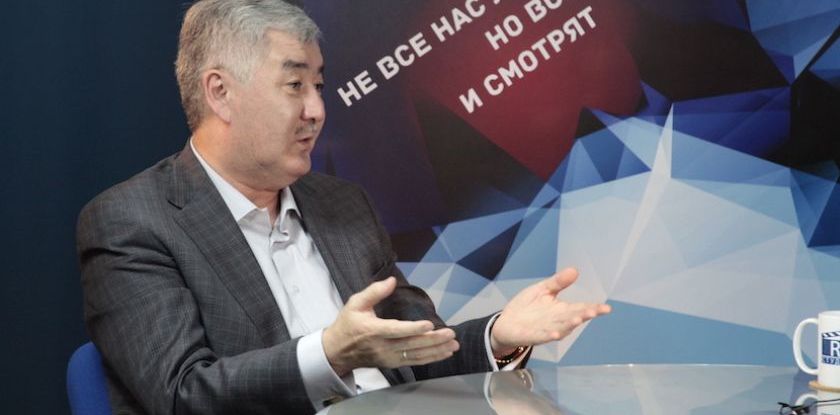The early presidential elections in Kazakhstan have successfully taken place. Now Kasym-Zhomart Tokayev has been legitimized as the second President of the country. However, this is not on this that we must congratulate Nazarbayev, Akorda and its political engineers. We must congratulate them on how ingeniously they have managed to solve the problem of the growing protest moods in the society having channeled them in a desired direction – the support of protest candidate Amirzhan Kosanov.
Note that the authorities have unofficially assisted Amirzhan Kosanov in his nomination as a presidential candidate and in positioning himself as such in the eyes of the civil society. To a large extent, it is due to this fact that the number of those who participated in the protests that took place in different Kazakh cities on June 9 and June 10 constituted only hundreds and not thousands.
In the context of the authoritarian political system and the super-presidential vertical, winning elections does not mean much. What is infinitely more important is the preservation of the proverbial internal political stability in the country, and Kazakhstan is yet to travel a long way to achieve it. And not only because of the growing social division and the decreasing level of life. The thing is that the radicals (first if all, politician in exile Mukhtar Ablyazov) have together managed to take the people to the streets.
This fact, together with the rude and unprincipled actions of the siloviki against the peaceful citizens who dared to express their dissatisfaction with Akorda’s policy, was noted and registered both in Kazakhstan and abroad. As a result, Akorda’s political engineers, while having achieved a tactical victory in the county, have completely lost the informational battle abroad.
Consequently, Akorda’s plans related to the political transition have been if not defeated but put into question. Because the reelection of Kasym-Zhomart Tokayev is but a private procedure of no real significance. We believe the authorities will face much more serious challenges during the parliamentary elections and after Nursultan Nazarbayev’s passing.
Amirzhan Kosanov is another participant of the process who deserves to be congratulated. Setting aside the moral side of his political “rebirth” and the de-facto betrayal of the people who trusted him and voted for him at the elections, he has won as well. For, after so many years spent in Akezhan Kazhegeldin’s shadow, he managed to achieve something that had been desired by many – to become a part of the political elite albeit getting pretty “dirty” in the process.
It does not matter now why Kosanov agreed to cooperate with Akorda. Something else is important here: he has made his choice. And he was not the first one of Akorda’s opponents to do so. He will not be the last one, either.
In this regard, one should recall the founders of the Democratic Choice of Kazakhstan (2001) – Kayrat Kelimbetov, Berik Imashev, Alikhan Baymenov (who sold the Ak Zhol Party to Azat Peruashev) or Vladislav Kosarev who, on Akorda’s order, split the Communist Party of Kazakhstan and created its pro-governmental clone, the Communist People’s Party of Kazakhstan (CPPK).
One can sympathize with Amirzhan Kosanov from a purely human perspective. A man who is pushing the retirement age and has basically no political and material prospects gets an opportunity to obtain both. Hard to resist.

We estimate his chances to create his own party and be elected as the Mazhilis (Lower House) member at the parliamentary elections as rather high ones. Albeit this is not going to be a sure thing. On the other hand, this will have little bearing on Kazakhstan’s internal political developments. It is simply that, instead of the two pseudo-protest structures, the Parliament will have three.
Apart from that, we allow for the possibility that the number of the pseudo-protest parties in the Kazakh Parliament will not grow since, in the course of the upcoming parliamentary elections, Akorda will invariably face the problem of Nur Otan’s positioning. On one hand, the ruling party must receive more than 50% of the votes to be elected which, given Nur Otan’s domination in the Senate, is quite feasible. On the other hand, the political alliance headed by Nursultan Nazarbayev is bound to receive a greater support than Kasym-Zhomart Tokayev, in other words, get more than 71% of the votes. Given the 7% vote threshold, this means that, inclusive of Nur Otan, there can be not more than four parties elected.
But here the subjective factors may come into play. For instance, the fact that, at the last elections, the Ak Zhol Party nominee Daniya Espayeva received 5.2% of the votes (according to preliminary information) whereas the CPPK nominee Zhambyl Akhmetbekov received only 1.83% of the votes which, for a parliamentary party, means a complete failure. And since the Communist Party of Kazakhstan does not exist anymore (it was closed based on the court’s decision), Akorda might “write off” the CPPK as well. If this happens, Nut Otan may well hope to receive more than 80% of the votes which, first, would please Nazarbayev, second, show that the Leader of the Nation enjoys a greater support of the citizens than his successor.
Amirzhan Kosanov, too, cannot count on becoming a member of the Parliament. Although, by the looks of it, he will get help in creating and registering his party. Moreover, based on the information provided by our insiders, the funding of this project is to grow dramatically against the current numbers.
Given all this, Kazakhstan’s internal political colormap may look like this:
- ruling party Nur Otan,
- pseudo-communist CPPK,
- pseudo-liberal Ak Zhol,
- pseudo-nationalist party led by Kosanov. They will try to include a significant part of the Kazakh nationalists and other protesters in it.
This colormap would allow Akorda to continue channeling the protest moods in a desired direction and under its unofficial control, in other words, preserving the proverbial internal political stability in the country. But alas, the society’s disappointment in Kosanov is likely to grow. And it will be impossible to stop given the Kazakhs’ general distrust to those in power. Therefore, Akorda’s attempt to mold Kosanov into Tokayev’s opponent and, what’s more, a national-scale political leader is doomed to fail.
We also believe that the National Social Democratic Party (NSDP) given by Zharmakhan Tuyakbay to Ermurat Bapi (yet another associate of Akezhan Kazhegeldin) will be closed based on the decision of the court. No tomorrow perhaps (so that it does not damage the transition picture) but in a foreseeable future since this political party is likely to hamper Kosanov’s positioning.
The authorities have more than enough arguments to justify their decision: it is likely that the actual size of the party does not reach the minimum stipulated by the law. The only thing that can save NSDP Akikat is if it is handed over to Amirzhan Kosanov which may not be possible due to some personal and political reasons.
As for Kasym-Zhomart Tokayev’s electoral win, we believe this fact to be of little significance since neither the outside nor the inside risks have not been reduced. His legitimation via the electoral procedure has not changed the attitude towards Kazakhstan’s authoritarian political system both in the country and abroad. Moreover, judging by the attention with which the foreign media are following the Kazakh political events, Akorda will not been successful in its attempts to convince the foreign audience that the country is changing for the better and one is safe to invest in it.

*Janus (Ianua — door, Lat.) — in ancient Roman religion and myth, Janus is a double-faced god of doors, gates, exits, passages, beginnings, endings and time. He is always depicted as having two faces, usually young and old and looking in the opposite directions.





